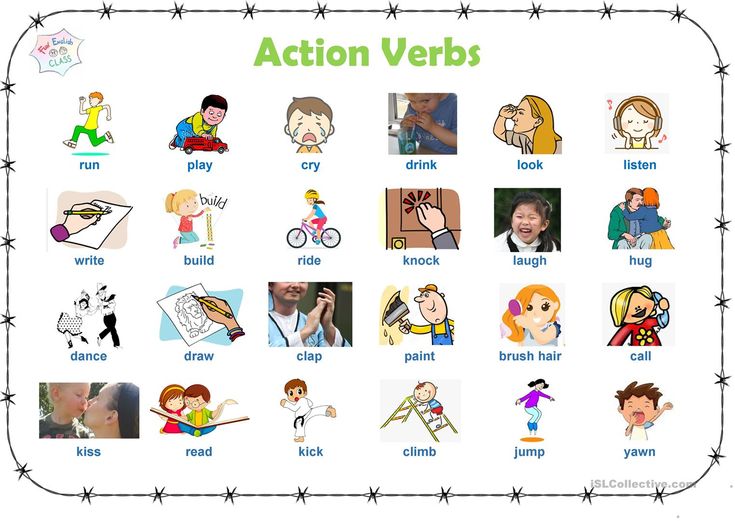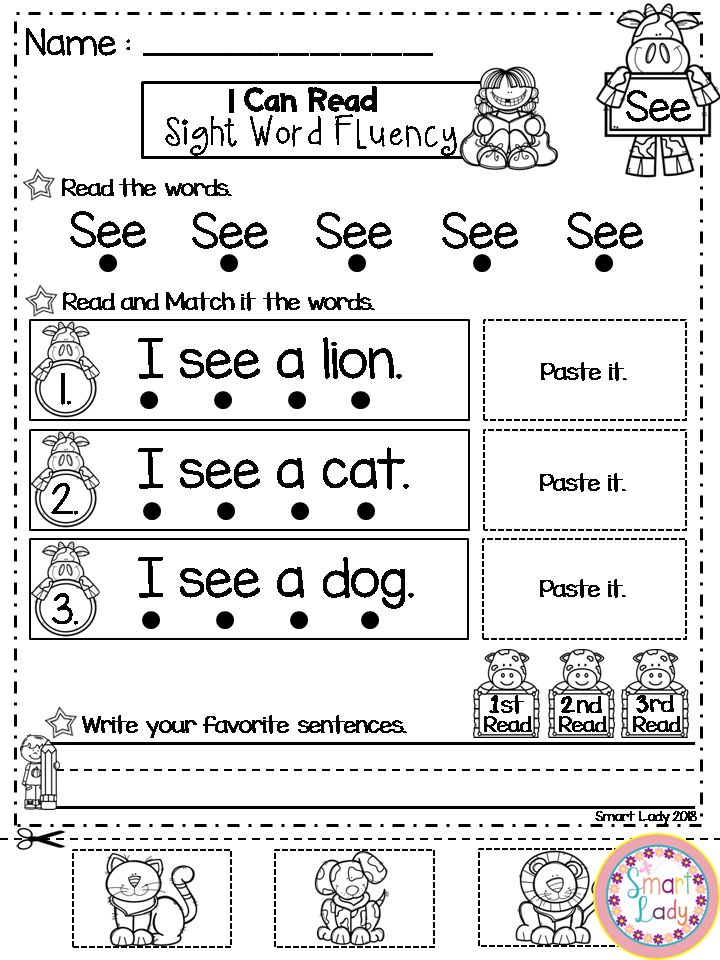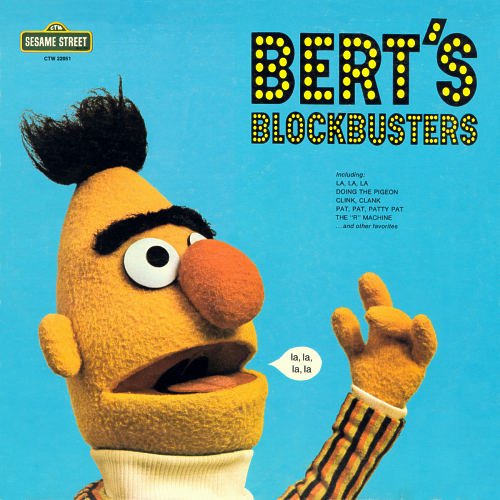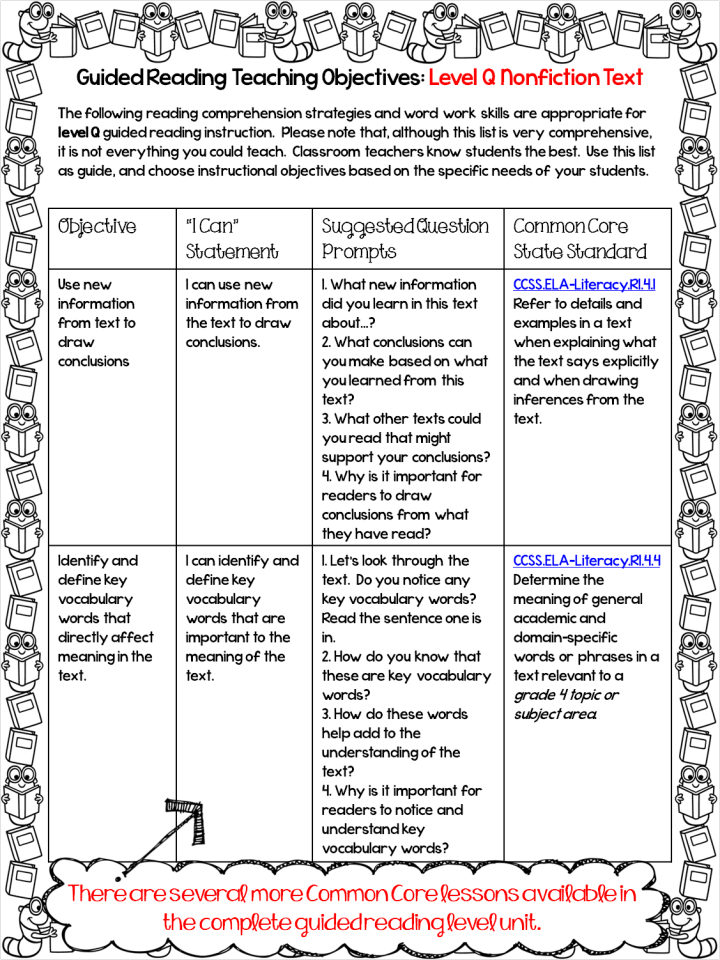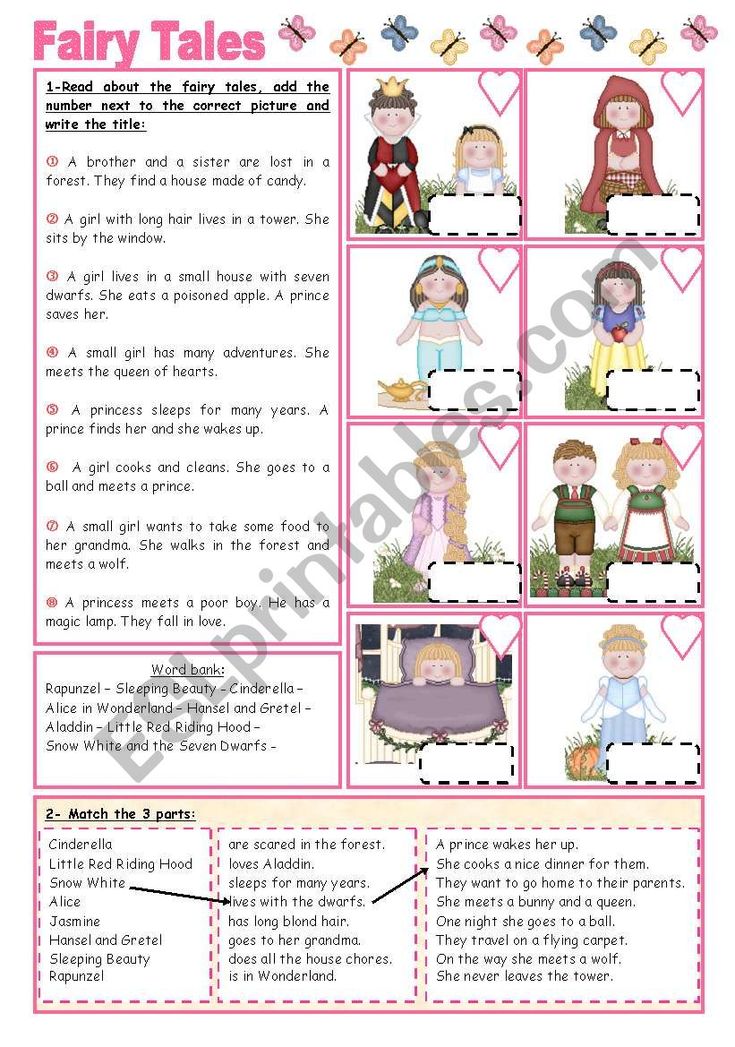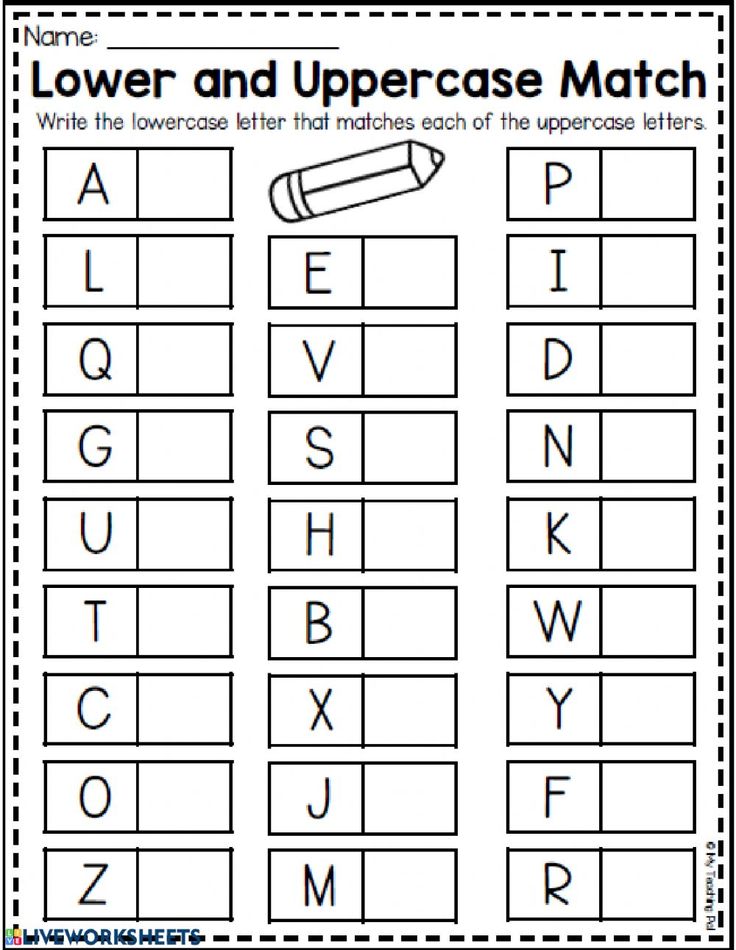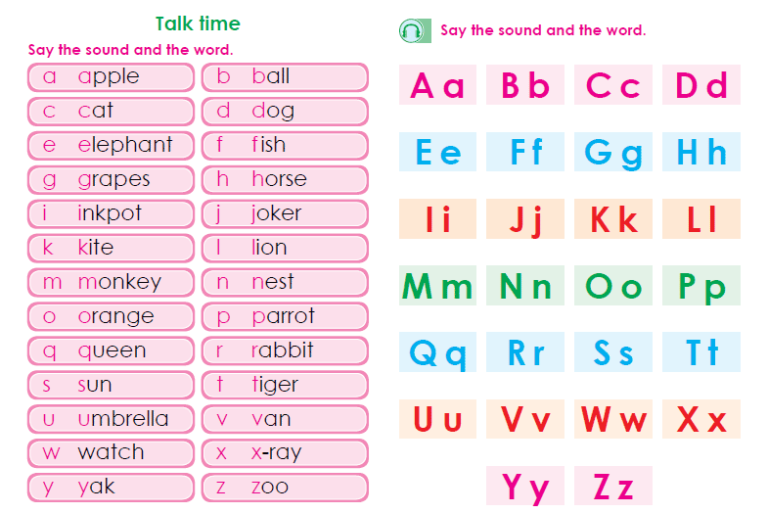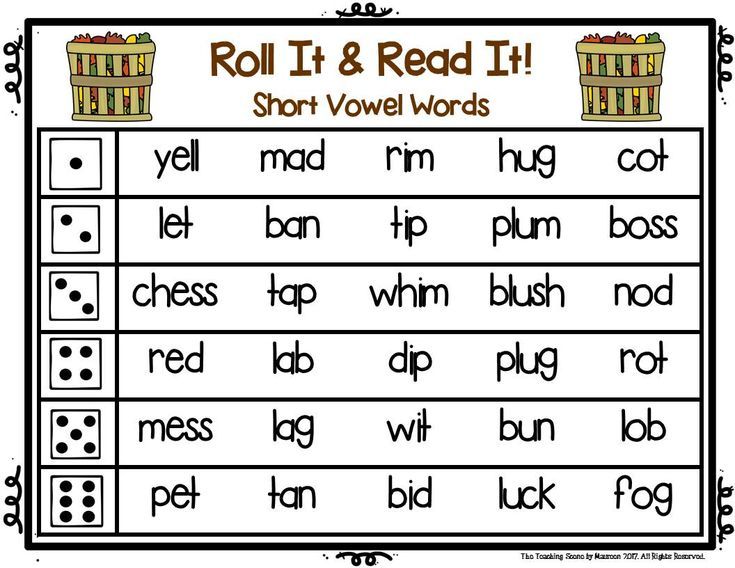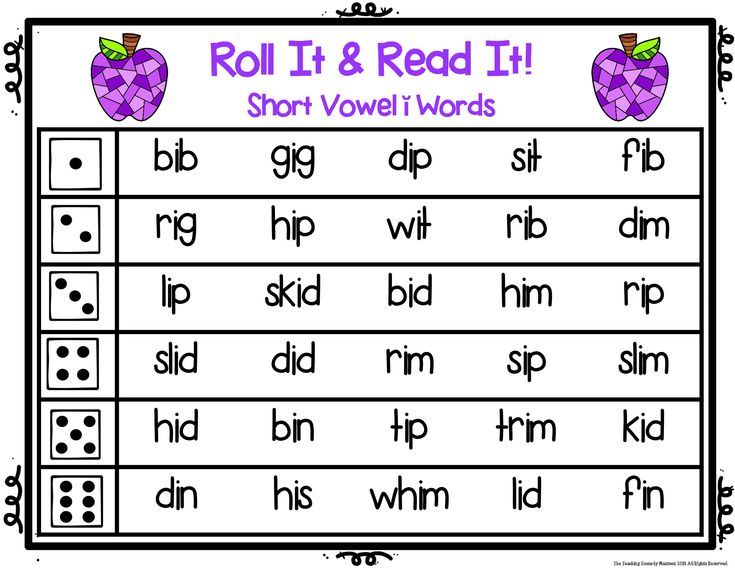Learning verbs in english
Learn English Verbs
Let's learn English verbs. And as usually, let's start from the beginning.
Click Here for Step-by-Step Rules, Stories and Exercises to Practice All English Tenses
What is a verb?
A verb is a word, or a group of words, which describe an action or a state.
For example:
sing
drive
write
Now, sing, drive and write are all verb because they are actions. But a verb can also be a state.
For example:
love
know
have
Love
, know and have are not actions, they are states. And they are verbs too.
A verb can be a word, or a group of words.
For example, in the sentence "I will win this time!", the verb is made of 2 words.
The word "verb" originally comes from the Latin word verbum, which means "word".
Person
Another important subject that will help you learn English verbs is the subject of person.
Now, what do we mean by that?
Each action (or state) has someone connected with it. In other words: Who? Who is doing it? Or, who is in that state?
We call it the "person."
When the verb shows an action or a state of the person speaking, we say the verb is in the first person.
In the following sentences the verbs are in the first person:
I go to school.
I like pasta.
We drink water.
When the verb shows an action or a state of the person you are speaking to, we say the verb is in the second person.
In the following sentences the verbs are in the second person:
You look pretty.
You sleep too much.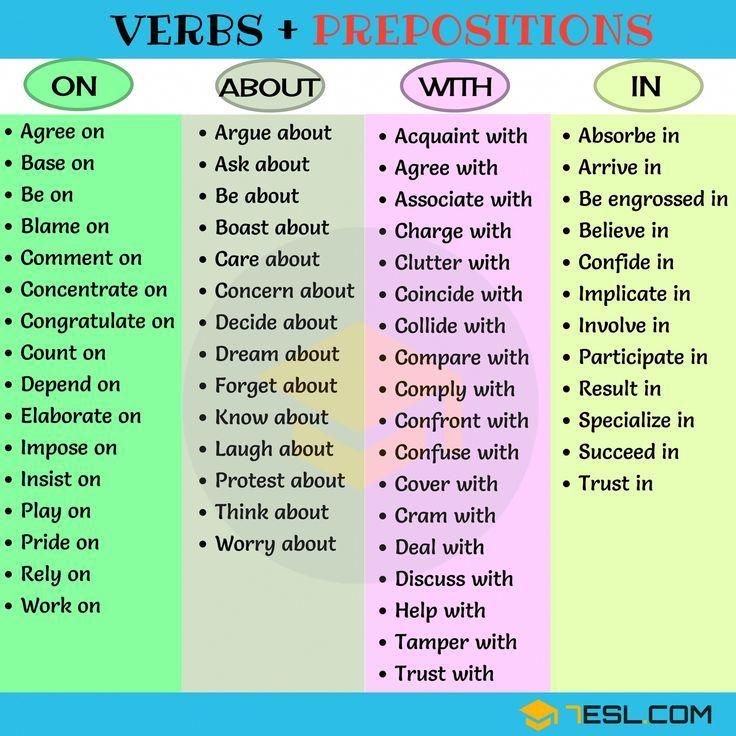
You play golf.
When the verb shows an action or a state of someone else, which is not present, we say the verb is in the third person.
In the following sentences the verbs are in the third person:
He is a good guy.
She has a garden.
It works fine.
They sing together.
Of course, just because we call it a "person" it does mean it has to be a real person! The action can be connected to an object, an animal, etc.
For example: The phone rings.
"Rings" is a verb in the third person.
Tense
In addition to person, each verb also has a certain time. In other words, when does it happen? Past, present or future? Is it complete or in progress? We call this the tense of the verb.
For the complete, step by step, guide of English Tenses visit this section.
In short, English has 12 different tenses, which show when the action or state take place.
In the following sentences the verbs are in the PAST tense:
In 1999 I lived in Toronto.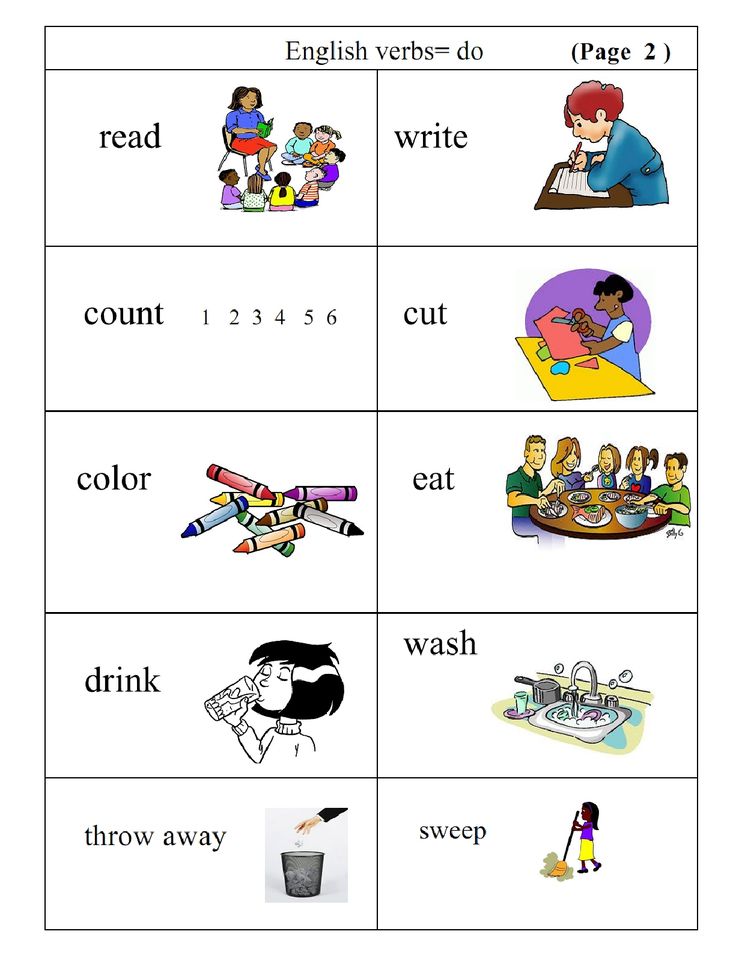
Yesterday we met on the beach.
He left an hour ago.
In the following sentences the verbs are in the PRESENT tense:
They visit us often.
I feel great.
You have a car.
In the following sentences the verbs are in the FUTURE tense:
The cat will catch the mouse.
Father will be here soon.
We will come to the party.
Sometimes just saying when the action or state take place is not enough. We might also want to mention whether the action is complete, or in progress. This is called the aspect.
In other words, a verb can indicate any of the following:
1) When the action takes place, with no additional information.
2) When the action takes place, and that it is in progress.
3) When the action takes place, and that it is complete.
4) When the action takes place, that it was in progress and that it is finally complete.
Now, don't faint just yet! Some examples follow.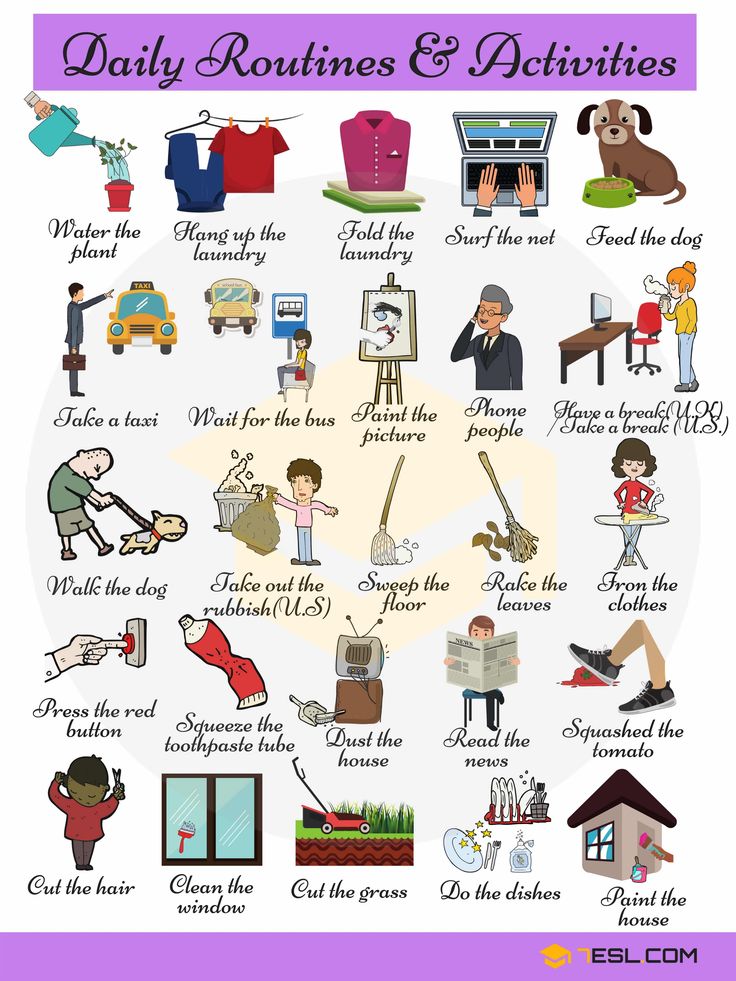 ..
..
1) When + no additional data (simple tenses):
Kate walked home.
(only shows when: in the past, no extra data)
Kate walks home every day.
(only shows when: in the present, no extra data)
Kate will walk home tonight.
(only shows when: in the future, no extra data)
2) When + in progress (progressive tenses):
Yesterday at 5 o'clock Kate was walking home.
(shows when: in the past, and also indicates the action was in progress)
Kate is walking home right now.
(shows when: in the present, and also indicates the action is in progress)
Tonight at 9 o'clock Kate will be walking home.
(shows when: in the future, and also indicates the action will be in progress)
3) When + completion (perfect tenses):
Kate had already walked before 8 o'clock.
(shows when: before something in the past, and also indicates the action was complete)
Kate has walked for a long time.
(shows when: before the present, and also indicates the action is complete)
By midnight, Kate will have walked home.
(shows when: before the future, and also indicates the action will be complete)
4) When + in progress + completion (perfect progressive tenses):
Kate had been walking for 2 hours before she got home.
(shows when: before something in the past, and also indicates the action was in progress and later it was complete)
Kate has been walking for 2 hours.
(shows when: before the present, and also indicates the action was in progress and now it is complete)
By the time Kate gets home, she will have been walking for 2 hours.
(shows when: before the future, and also indicates the action will be in progress and then it will be complete)
Learn English Verbs – Final Words
English verbs are an important part of English. Learn English verbs well, and you are well on your way to mastering the English language.
But how can you do that?
In order for you to learn English verbs, you first need to understand the basics of the subject, like the ones we covered in this section.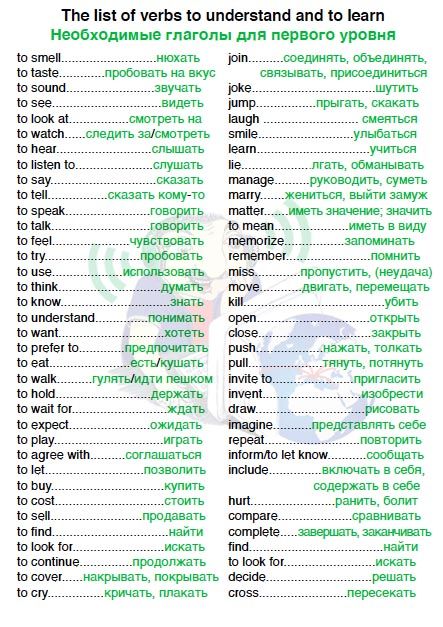
Then you should practice them until you know them very well.
Continue that way and gradually increase your vocabulary. Learn English verbs that are new to you and practice them in real life sentences!
Your Next Steps
-
If you wish, you can REREAD this Learn English Verbs section
- Study the complete step by step guide of English Tenses
- Learn about regular verbs ("worked") and irregular verbs ("ate")
- Learn about stative verbs ("love") and dynamic verbs (action verbs) ("break")
- Learn the differences between gerunds ("walking") and infinitives ("to walk"), and when to use each of them
- Learn the English modal verbs (can, could, may, might, must, ought to, shall, will and would)
- Learn the difference between main verbs ("go"), auxiliary verbs (helping verbs) ("are") and compound verbs ("are going")
- Learn about English linking verbs ("seem")
- Learn the difference between English transitive verbs ("drink") and intransitive verbs ("stand")
- Learn about English phrasal verbs ("run into")
- Get help in teaching helping verbs
Get Updates, Special Offers, and English Resources
Download your FREE GIFT (the first two chapters of
English Short Stories Book and Workbook)
as soon as you join!
By submitting your email, you consent to receiving updates and newsletters from us and to the sharing of your personal data with third parties for the purposes of sending you communications.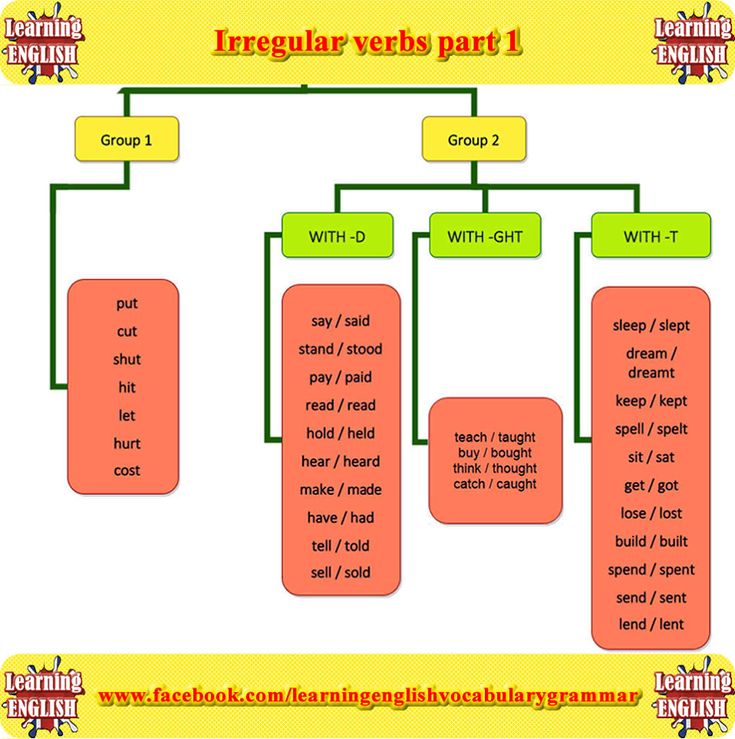 We will not spam you. You can unsubscribe at any time. For more information, please see our privacy policy.
We will not spam you. You can unsubscribe at any time. For more information, please see our privacy policy.
54 Most Common English Verbs (with Meanings and Examples)
By Laura Grace Tarpley Last updated:
Every day you speak up to 20,000 words.
That’s more than 1,000 words for every hour you’re awake!
How well do you really know your verbs though? Are you using each verb correctly?
Do you know all the different situations you can use these words for? Think about that!
Read on to learn 54 of the most common ones in English.
Contents
- 1. to ask
- 2. to be
- 3. to buy
- 4. to camp
- 5. to clean (up)
- 6. to close
- 7. to come
- 8. to cook
- 9. to contact
- 10. to do
- 11. to drink
- 12. to eat
- 13. to explain
- 14.
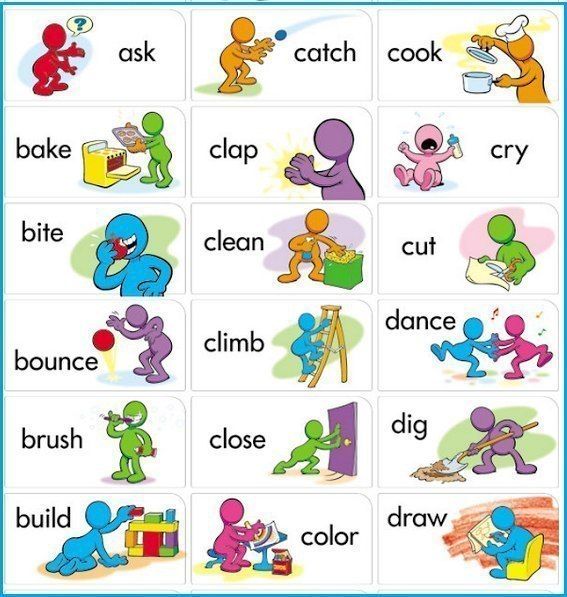 to explore
to explore - 15. to finish
- 16. to fly
- 17. to get
- 18. to give
- 19. to go
- 20. to have
- 21. to hear
- 22. to know
- 23. to learn
- 24. to like
- 25. to listen
- 26. to look
- 27. to love
- 28. to make
- 29. to need
- 30. to open
- 31. to pay
- 32. to read
- 33. to relax
- 34. to ride
- 35. to say
- 36. to see
- 37. to sell
- 38. to send
- 39. to ski
- 40. to sleep
- 41. to stay
- 42. to swim
- 43. to study
- 44. to submit
- 45. to take
- 46. to teach
- 47. to think
- 48. to travel
- 49. to visit
- 50. to use
- 51. to want
- 52. to watch
- 53. to work
- 54. to write
- Ways to Practice English Verbs
Download: This blog post is available as a convenient and portable PDF that you can take anywhere.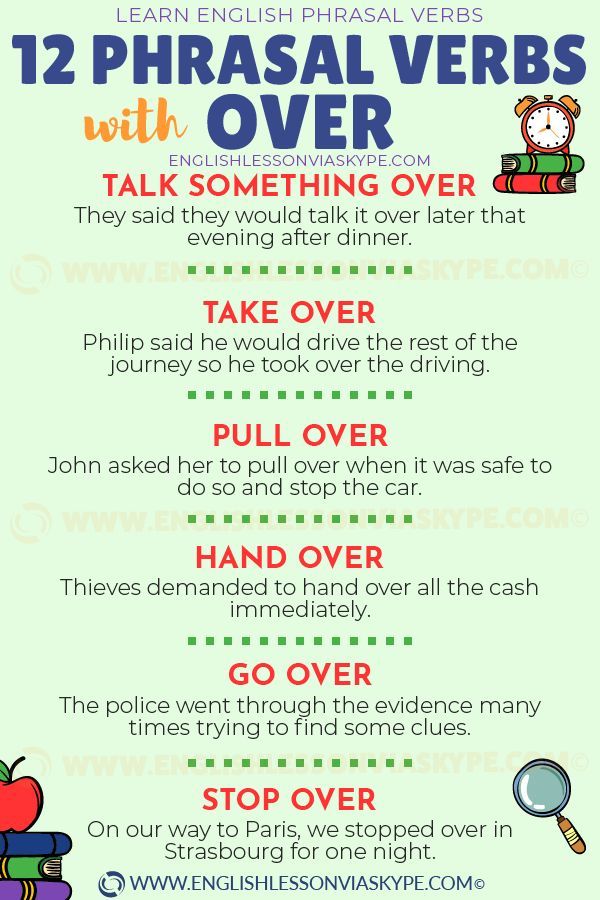 Click here to get a copy. (Download)
Click here to get a copy. (Download)
Definition 1: to say something to gain information
Did you ask the teacher when your homework assignment is due?
Definition 2: to request something from someone
Mom asked me to clean my room.
How to conjugate “to ask”
Definition 1: to exist
He is the only male cousin in his family.
Definition 2: to occur or take place
The conference will be next Wednesday.
How to conjugate “to be”
Definition: to obtain in exchange for payment
We need to buy more uniforms for the new employees.
How to conjugate “to buy”
Definition: to stay in a tent or camper
Note: You can say to camp or to go camping.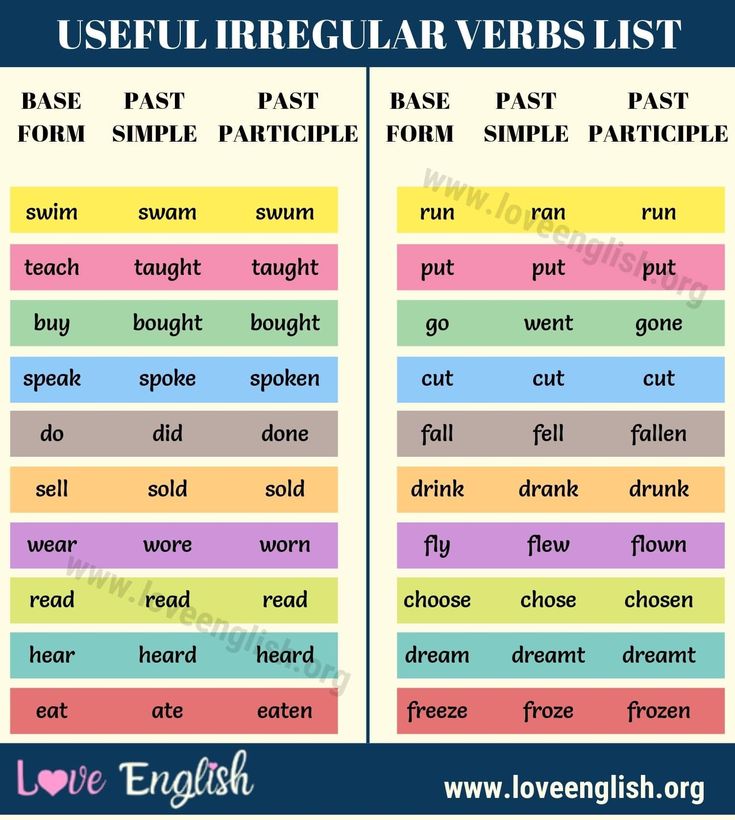
Let’s camp in the mountains this weekend.
Do you want to go camping in the state park?
How to conjugate “to camp”
Definition: to make something free of dirt or mess
Let’s clean the living room before we have guests over.
Did you clean up the mess on the kitchen counter?
How to conjugate “to clean”
Definition: to move as to cover an opening
Close the refrigerator door so we don’t waste electricity.
How to conjugate “to close”
Definition: to move towards, to happen.
Spread love everywhere you go. Let no one ever come to you without leaving happier.
How to conjugate “to come”
Definition: to prepare food or a meal
Dad loves to cook healthy meals for the family.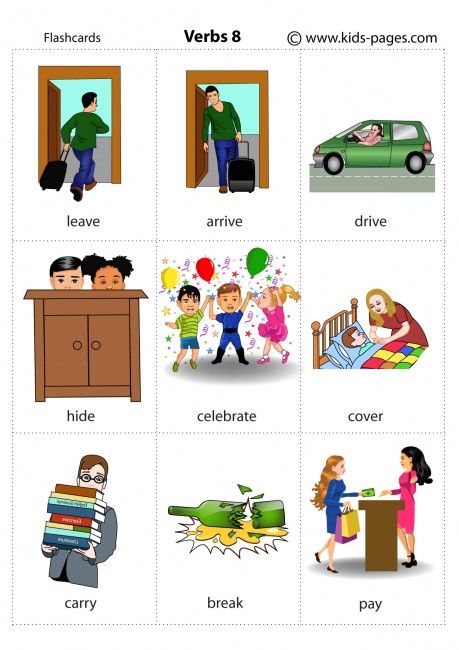
How to conjugate “to cook”
Definition: to communicate with someone
A: Have you contacted the manager yet?
B: Yes, I called her cell phone this morning.
How to conjugate “to contact”
Definition 1: to perform an action
A: What do you like to do on weekends?
B: I usually watch TV and play with my dogs.
Definition 2: to act in a certain way
My favorite football team is doing poorly.
How to conjugate “to do”
Definition: to put liquid in your mouth and swallow it
Don’t forget to drink water before you go to bed.
How to conjugate “to drink”
Definition: to put food in your mouth and swallow it
Do you want to eat pizza or chicken for dinner?
How to conjugate “to eat”
Definition: to describe an idea to someone so that they understand it
A: Can you explain how to create this document to me?
B: Sure! First, select a template in Microsoft Word.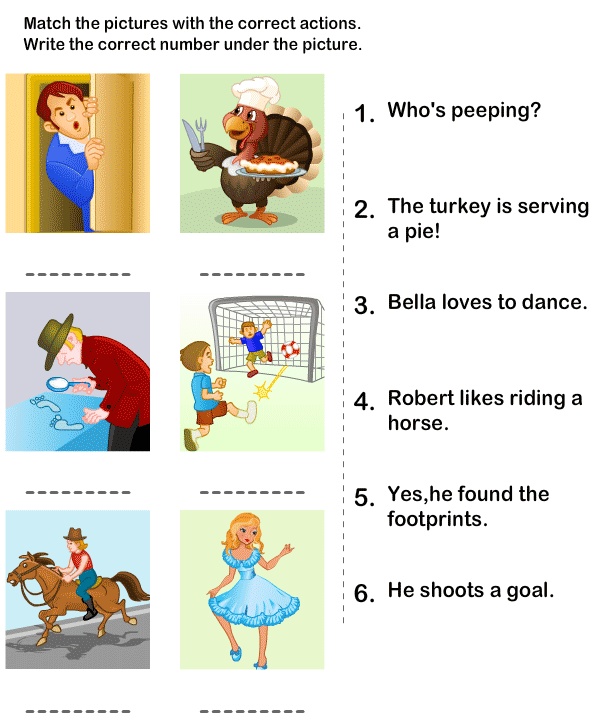
How to conjugate “to explain”
Definition: to travel through a new place
Do you want to explore the neighborhood before we go home?
How to conjugate “to explore”
Definition: to complete
A: When do you think you can finish writing that speech?
B: I should finish it by the end of the day on Tuesday.
How to conjugate “to finish”
Definition: to move through the air
Note: You’ll often hear fly when referring to animals like birds. But when applied to travel, fly means to travel by airplane.
I am flying from Atlanta to New York at 4:00.
How to conjugation “to fly”
Definition 1: to receive
A: Has the letter I sent arrived yet?
B: Yes, I got it.
Definition 2: to obtain or fetch
Can you get my jacket from the closet for me?
Definition 3: to understand
A: Are you still studying for the English test?
B: Yes.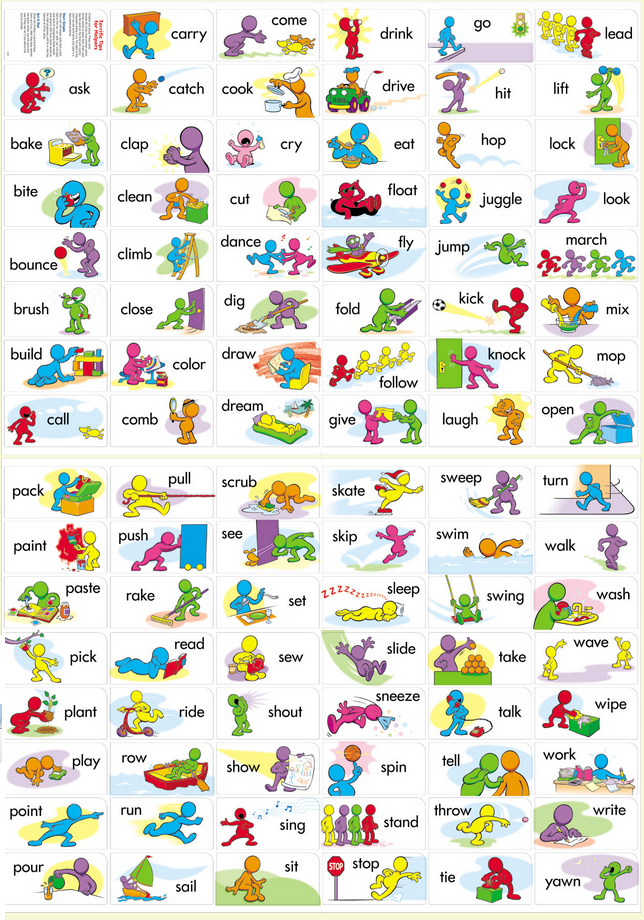 I just don’t get how to conjugate verbs!
I just don’t get how to conjugate verbs!
How to conjugate “to get”
Definition: to transfer something, to provide, to state information.
Give me a glass of water, please.
How to conjugate “to give”
Definition 1: to move from one place to another
Are you going to the concert next weekend?
Definition 2: to leave
It’s already 11:00? I have to go!
How to conjugate “to go”
Definition 1: to own or hold
I have two dogs.
Definition 2: to experience
We had a good time at the restaurant last night.
How to conjugate “to have”
Definition 1: to take in a sound with your ears
A: Did you hear that sound?
B: Yeah, but don’t worry, I think it’s just the wind.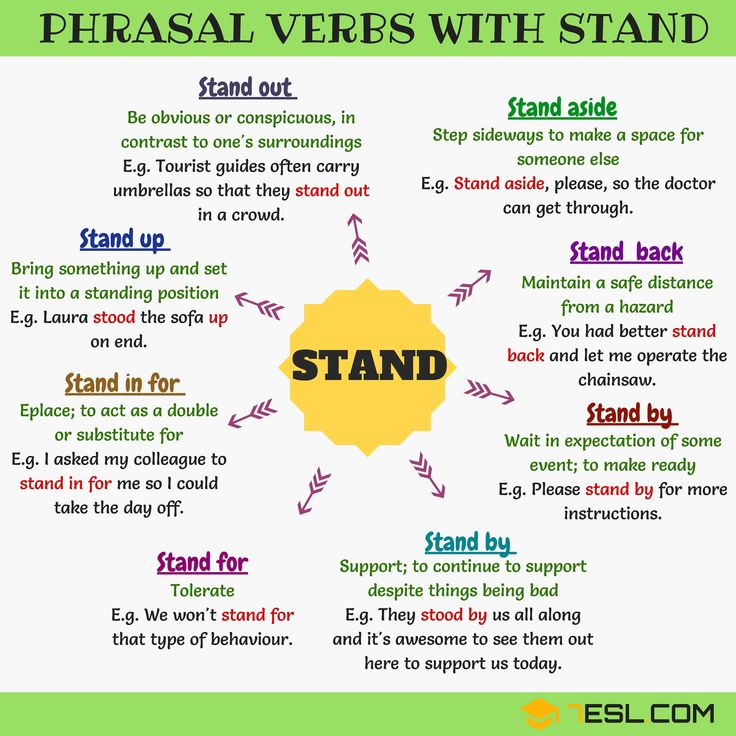
Definition 2: to be aware of
Did you hear about Taylor Swift’s new cat?
How to conjugate “to hear”
Definition 1: to be aware of
Did you know that Taylor Swift got a new cat?
Definition 2: to have a relationship with someone
A: Do you know Sarah?
B: Yes, we used to work together.
How to conjugate “to know”
Definition: to gain knowledge of or skill in something
I am learning a lot in my English class!
How to conjugate “to learn”
Definition: to enjoy
A: Do you like the TV show “Supernatural?”
B: Yes, but I like “Breaking Bad” more.
How to conjugate “to like”
Definition: to pay attention to sound
Did you listen to the teacher’s instructions?
How to conjugate “to listen”
Definition: to search for something with your eyes
People were looking at him
How to conjugate “to look”
Definition 1: to like a lot
A: Do you like the movie “Ocean’s 11?”
B: Yes, I love that movie!
Definition 2: to have deep romantic or emotional feelings for
I know your mom is strict, but remember that she loves you.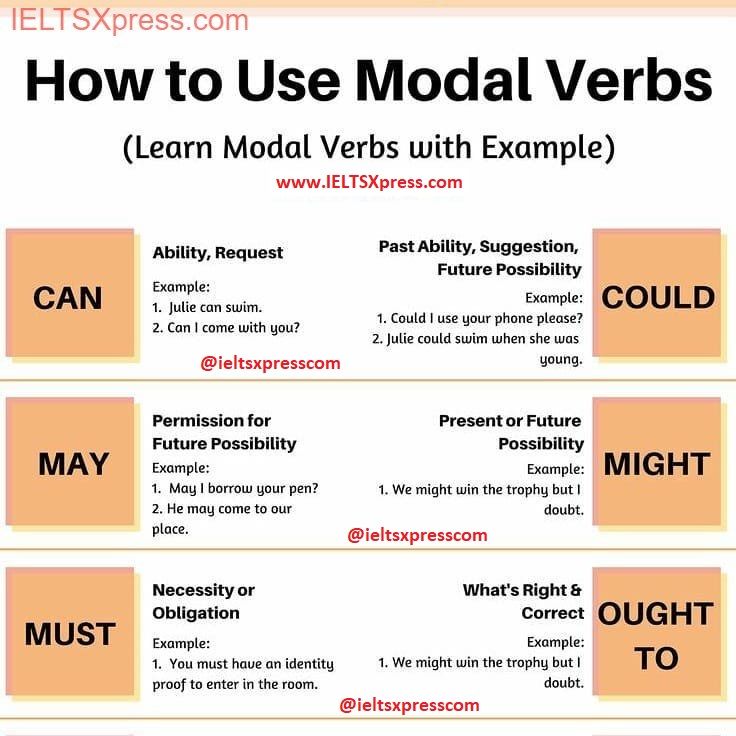
I love Steve—I want to marry him!
How to conjugate “to love”
Definition: to bring something into existence
Take chances, make mistakes, get messy!
How to conjugate “to make”
Definition: to require
I need a pencil to take the test.
How to conjugate “to need”
Definition: to move something so that there is a space for access or view
I can’t open this pickle jar—can you help?
Open the window so the fresh air can get in.
How to conjugate “to open”
Definition: to give currency in exchange for an item or service
A: Where do I pay for this necklace?
B: You can pay at the cash register at the front of the store.
A: Did the boss pay us yet?
B: No, he pays us every Friday.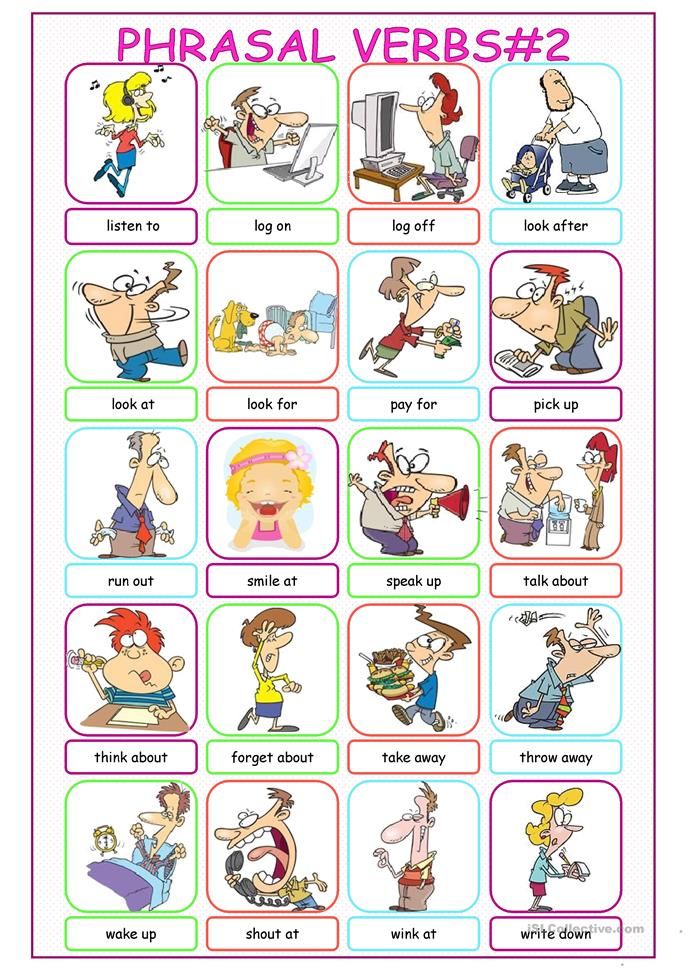
How to conjugate “to pay”
Definition:
to look at and understand written text
Everyone remember to read the first chapter of your textbook by tomorrow.
How to conjugate “to read”
Definition 1: to become less anxious
You need to relax! Hopefully, going on vacation will help.
Definition 2: to partake in an enjoyable activity
Dad is relaxing in the hammock outside.
How to conjugate “to relax”
Definition: to travel in a vehicle
The Eiffel Tower is too far away for us to walk. Let’s ride the bus.
How to conjugate “to ride”
Definition 1: to utter words aloud
A: What did she say?
B: She said that she will think about it.
Definition 2: to convey information
The website says the museum will open at 8:00.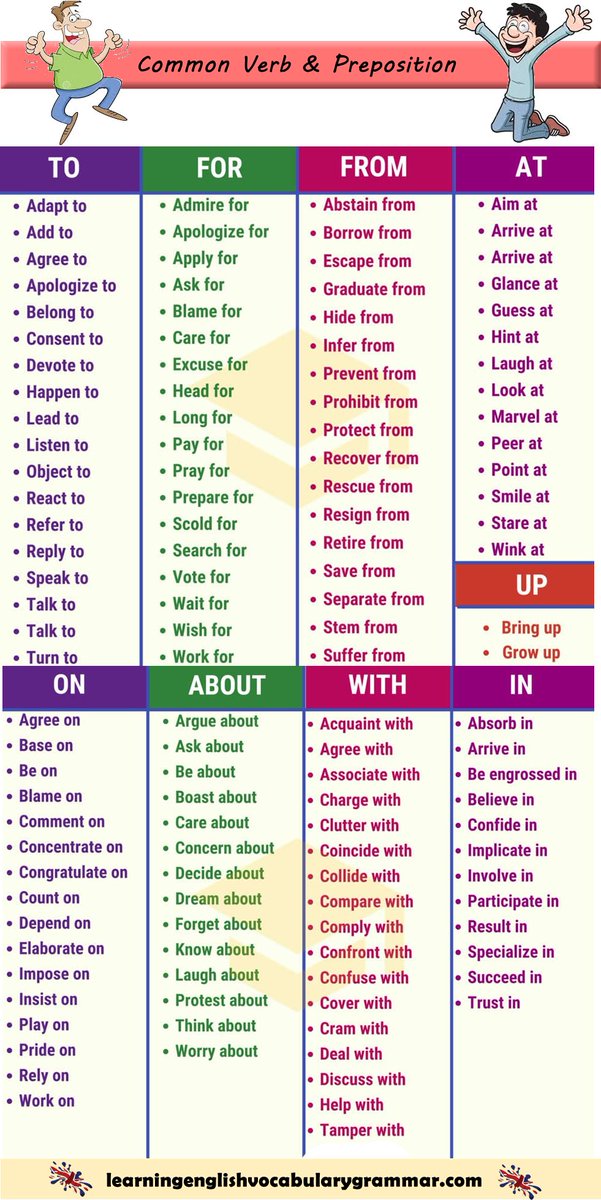
How to conjugate “to say”
Definition: to use your eyes to perceive something
I can see you from that building!
How to conjugate “to see”
Definition: to give in exchange for payment
I sold 12 boxes this week.
How to conjugate “to sell”
Definition: to arrange for the delivery of
A: Have you contacted the manager yet?
B: No, but I will send her an email tomorrow.
I sent the team the memo yesterday.
How to conjugate “to send”
Definition: to travel over snow on skis
Note: As with to camp, you can say to ski or to go skiing.
Would you rather ski in Colorado or Utah?
My family and I go skiing every winter.
How to conjugate “to ski”
Definition: to be asleep
I try to sleep for at least eight hours every night.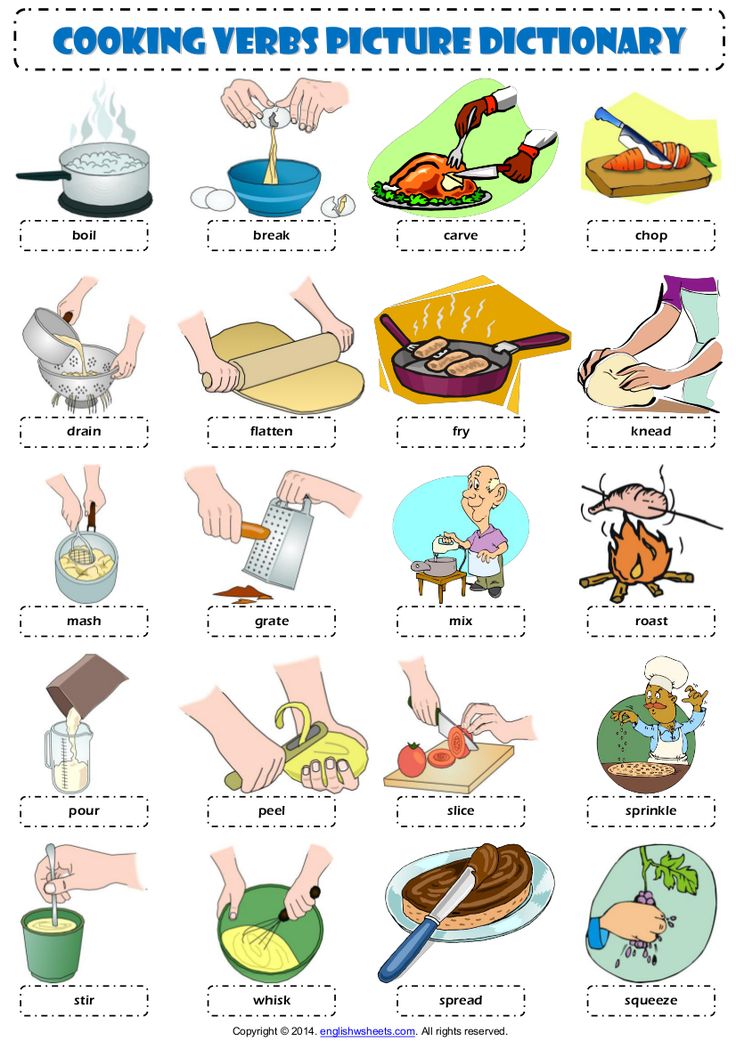
How to conjugate “to sleep”
Definition: to remain in one place
Note: You can also use to stay to refer to where you’re temporarily living in a hotel or hostel.
A: You’re going to Sydney? Where are you going to stay?
B: I am staying at a hotel just outside of the city.
A: [on the phone] Where are you?
B: I’m standing at the bus stop.
A: Stay there. I’m on my way.
How to conjugate “to stay”
Definition: to move through water
Note: Like with to camp and to ski, you can say to swim or to go swimming.
Let’s swim in the pool after lunch.
Do you want to go swimming this weekend?
How to conjugate “to swim”
Definition: to devote time to an academic field
Note: In college, if you say “I am studying math,” this implies that math is your college major, and you’ll earn your degree in math.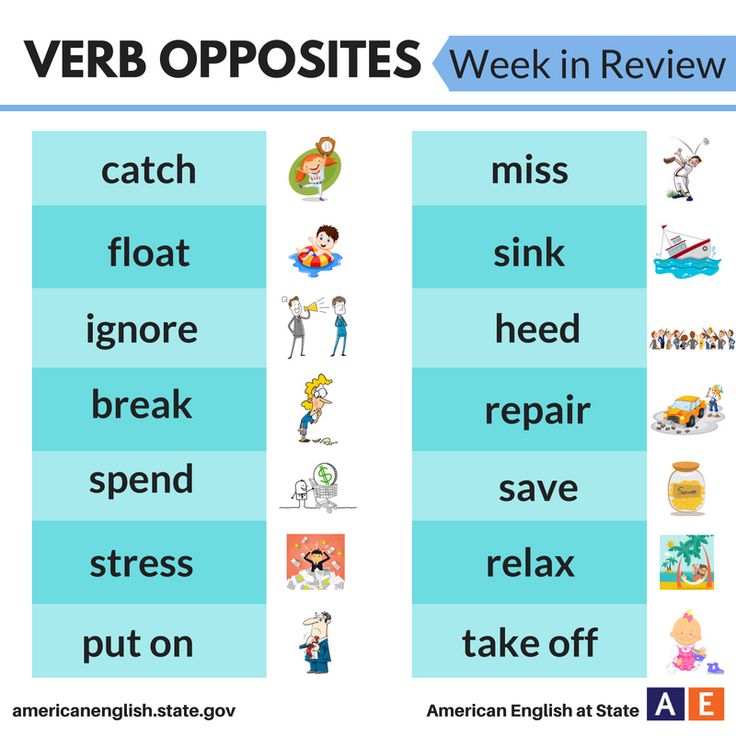 If you say “I am studying for the math test,” this means you’re studying for something specific for a short amount of time.
If you say “I am studying for the math test,” this means you’re studying for something specific for a short amount of time.
A: I hear you are starting college in the fall. What do you want to study?
B: I think I want to major in history.
A: Do you want to play basketball tomorrow night?
B: I can’t. I have to study for my communication class.
A: What are you studying for?
B: I have a huge test on Friday.
How to conjugate “to study”
Definition: to present to someone for judgment
I have to submit my report to the manager by 5:00.
How to conjugate “submit”
Definition: to reach for something with your hands
She took another biscuit.
How to conjugate “to take”
Definition: to show or explain how to do something
The professor will teach us how to read the data in tomorrow’s class.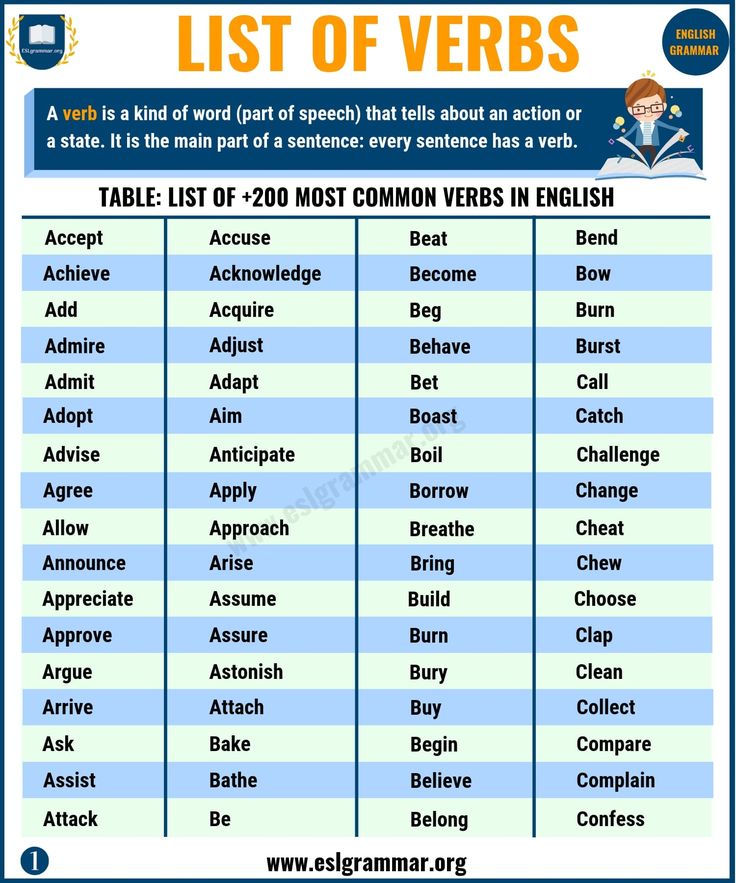
How to conjugate “to teach”
Definition 1: to have an opinion or belief
I don’t think the color red looks good on me.
I think God is real.
Definition 2: to direct your mind toward something
A: What are you thinking about?
B: I am thinking about what I want to eat for lunch.
How to conjugate “to think”
Definition: to make a journey
My dad and I are traveling to Spain this summer.
How to conjugate “to travel”
Definition: to go see someone or something
I want to visit my grandmother next month.
Let’s visit as many attractions as we can.
How to conjugate “to visit”
Definition 1: to put something to work
She used her key to open the front door.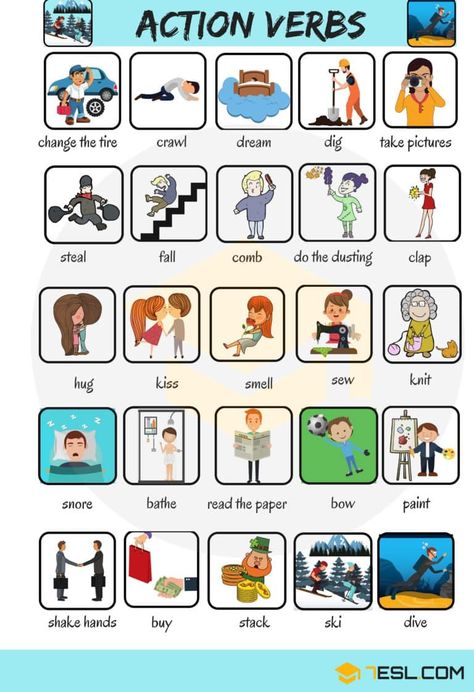
How to conjugate “to use”
Definition: to desire
I want a puppy, but I would adopt an older dog if I found the right one.
How to conjugate “to want”
Definition: to look at or observe
You can watch TV for 30 minutes when we get home.
How to conjugate “to watch”
Definition: to be engaged in a practical activity, especially at one’s job
I’m an elementary school teacher. I work at the school down the street.
How to conjugate “to work”
Definition 1: to mark words on a surface
Can you write the rules on the chalkboard?
Definition 2: to compose a document
I have to write a six-page paper by Monday morning.
How to conjugate “to write”
Ways to Practice English Verbs
Act out the verbs
Transforming words into actions can help your brain memorize vocabulary.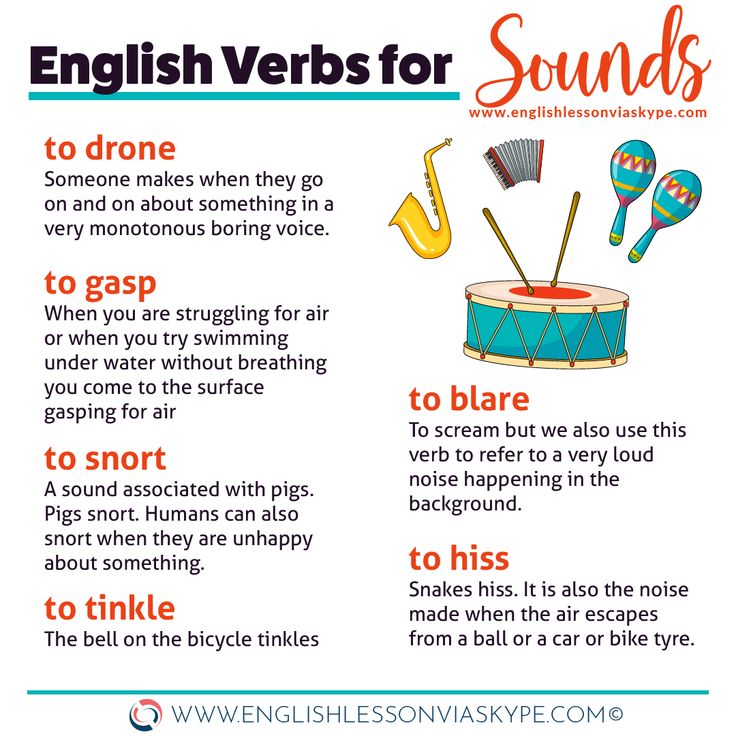
Write verbs on individual slips of paper, and put each slip into a hat. Draw a piece of paper out of the hat and act out the verb, then another, and another and so on.
You can easily do this activity by yourself.
Or, if you have a couple of friends who are also learning English, you can make a game out of it!
Play a form of Charades. While you act out a verb, your friends have to guess what the verb on the piece of paper is.
Make flashcards
This study method is a quick way to memorize vocab words!
Write the English word on one side of the card, then the definition (in either English or your native tongue, depending on your level) on the other side.
You may buy a set of physical flashcards and create a deck the old-fashioned way. Or, download an app that allows you to create digital flashcard decks.
On the FluentU program, you can make your own flashcard sets based on the videos you watch or study the ready-made themed decks.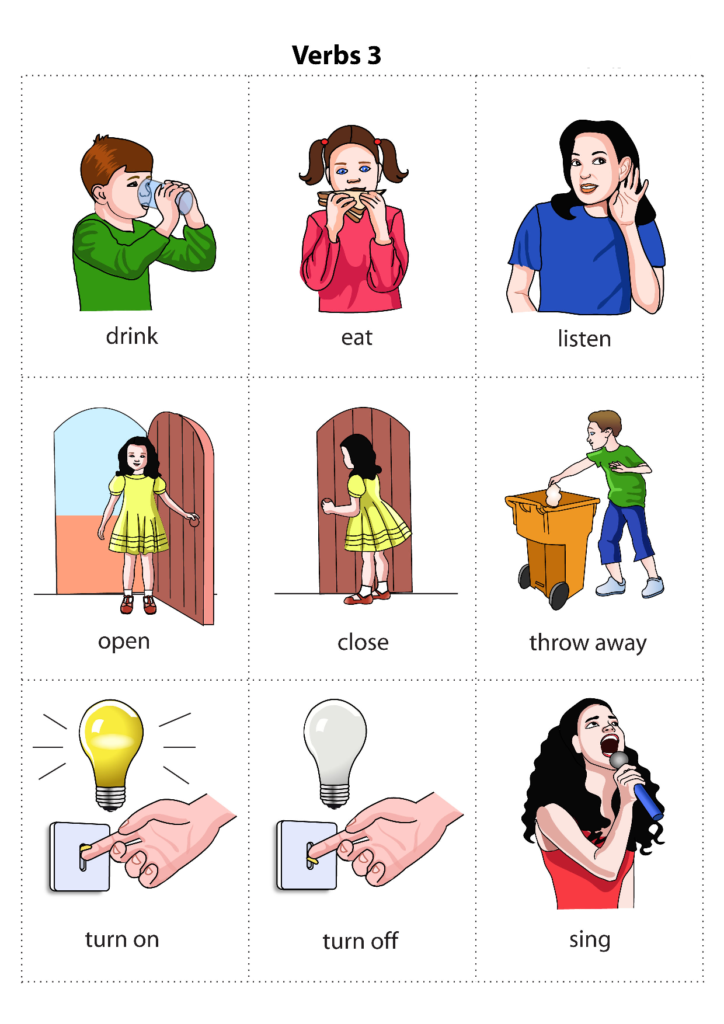
Write a story
It helps to make sure you can use the verbs on your own.
Try writing a short story, and challenge yourself to use 10 or 15 of the verbs you’re studying in the story. If you have a friend who’s also an English student, swap (trade) and proofread each other’s stories.
If you’re someone who remembers material by writing, this is a great exercise to put your knowledge to the test.
Everywhere you go, everywhere you look, there’s a verb. Once you’ve mastered these basic verbs, you can move on to more and more advanced ones.
There’s always more to learn!
Download: This blog post is available as a convenient and portable PDF that you can take anywhere. Click here to get a copy. (Download)
« 160 Nature Words to Grow Your English
American and British Talk Shows to Learn English Conversation »
55 English verbs you need to know to "survive"
This collection will be extremely useful for everyone who starts learning English on their own, and for those whose level of knowledge of the language is somewhere at the initial step.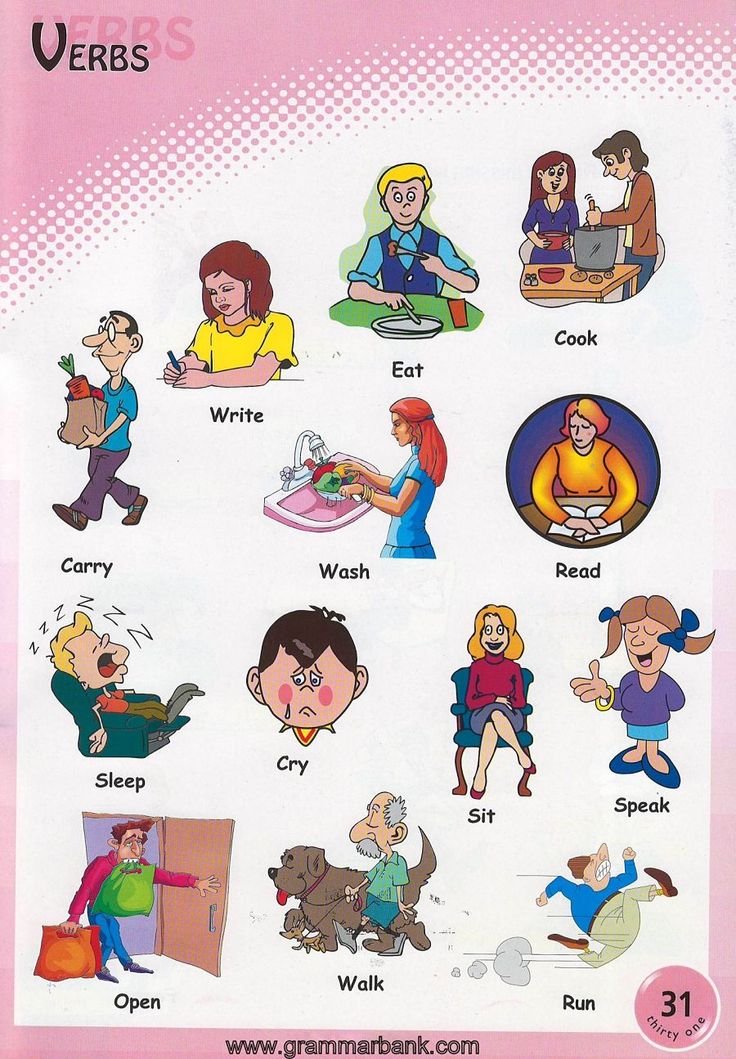 I tried to choose the most necessary English verbs. Of course, this list can and should be expanded, but that's a completely different story. Everything has its time.
I tried to choose the most necessary English verbs. Of course, this list can and should be expanded, but that's a completely different story. Everything has its time.
My task was to prepare for you a list of English verbs for "survival" - ie. to help you understand basic English.
If you are just starting to learn English, this list will be more than ever helpful. All verbs are given in their initial form - the infinitive. Many verbs have more than one meaning, so I give only the very first one, you can look up the rest of the meanings in the dictionary if you are interested.
Fundamental English verbs
- Be – be
- Have - have
- Do - do
- Make - make
- Get - get
- Take - take
- Try - try
- Know - know
- Think - think
- Feel - feel
- See
- Give - give
- Bring - bring
- Buy - buy
- Cost - cost (about the price)
- Break - destroy
- Put
- Eat - eat (eat)
- Sleep - sleep
- Drink - drink
- Understand
- Write - write
- Read
- Speak
- Tell - tell
- Meet - meet
- Teach - teach
- Learn
- Send – send
Article in the topic:
How to say "I like" or "I don't like" in English in different ways
- Forget - forget
- Dream - dream
- Pay - pay
- Sell - sell
- Call - call
- Play – Play
- Drive - drive a car
- Travel - travel
- Start - start
- Stop - stop
- Need
- Use - use
- Can - to be able (to be able)
- Clean - clean
- Help - help
- Run - run
- Cook - cook food
- Open - open
- Close
- Move – move
- Sing - sing
- Swim - swim
- Dance - dance
- Work - work
Having learned these English verbs and set phrases, you will be able to understand everyday English in an elementary way, that is, you will need these basic knowledge at first.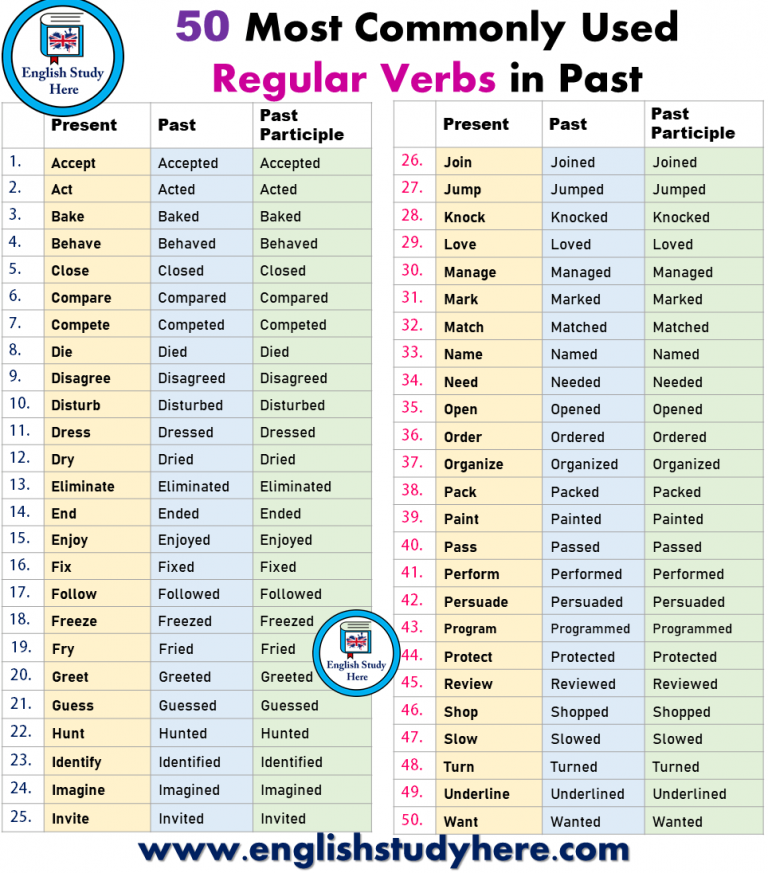 Further it is worth deepening knowledge and learning more English verbs.
Further it is worth deepening knowledge and learning more English verbs.
Article in the topic:
How to learn to write in a foreign language and learn the alphabet on your own: useful tips
Necessary stable phrases
There are times when self-study of a language comes to a standstill, you simply cannot force yourself to sit down and open a book, or some material remains incomprehensible.
Get more tips to Grow your vocabulary
Improve your vocabulary with a full range of videos, articles and live lessons!
Explore resources
In this case, I advise you to contact tutors who know how to help you learn a new language, give you the right direction, explain complex material.